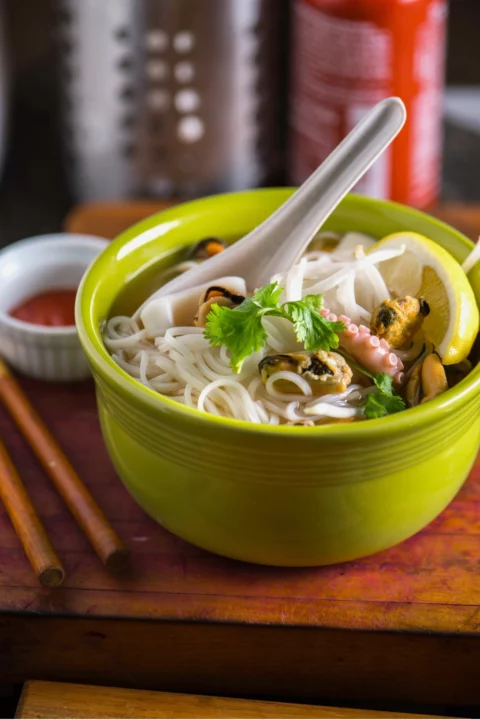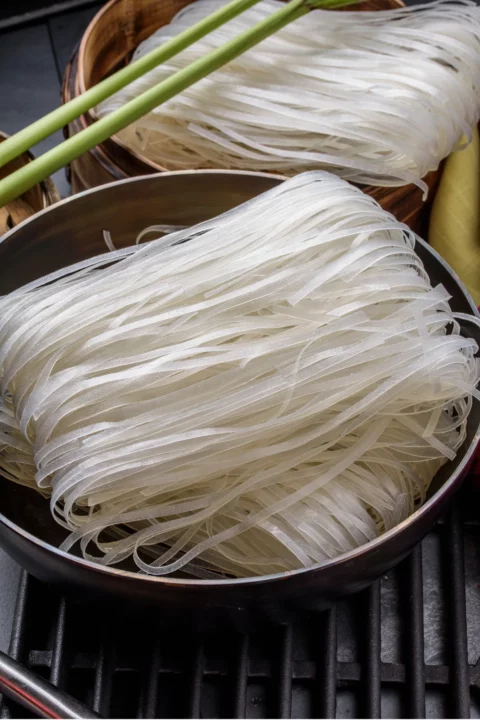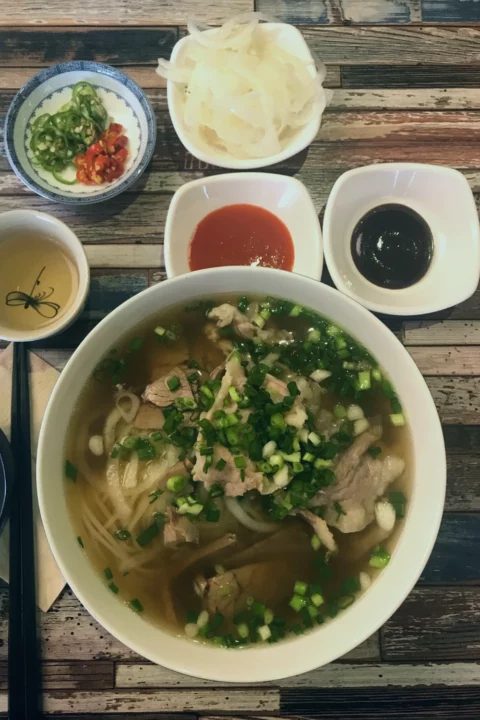Have you ever cooked rice noodles leftover and wondered what to do with them? How long can you store them, or can you freeze cooked rice noodles without ruining them? Noodles are very easy to prepare and serve as a quick fix for our hunger. But they do not have a very long shelf-life. Sometimes you might boil more than you want, or the gravy is not enough for all, so you might need to freeze them.
Yes, cooked rice noodles can be frozen for up to 2 months. However, frozen cooked noodles will feel lumpy since the noodles lose texture in the fridge. Thus, experts advise using the cooked noodles in a salad rather than putting them in the refrigerator.
How to freeze cooked rice noodles?
If you realize while boiling that you are not going to consume all the rice noodles, do not mix the sauce in the entire boiled serving. Separate the amount that you need to freeze.
Make sure that the rice noodles are cool and dry. Place the soaked or cooked rice noodles in a shallow flat container or a freezer-friendly zip-lock plastic bag, and place it in the freezer. This will contain for up to 4 days. You can also freeze the rice noodles for storing them for up to 2 months.
A way to avoid clumping while freezing is to put your rice noodles under cool water and wash them. This way, the starch washes away, which causes them to stick together. After draining them, mix a little oil to avoid clumping.

If you have cooked them in broth, separate the broth and the noodles before freezing them. Make sure your noodles are cool and dry. If you have mixed the sauce already and have any leftovers, you can simply put them in a freezer-friendly container or zip-lock bag and toss them in the freezer. This will reduce their shelf-life and compromise their texture a lot, so it is advised that you do not do this. However, they are still safe to eat and freeze, so it is up to you.
Pro tip: Make sure you don’t fill the container to the brink. Also, keep in mind to label it with the storage date.
How long can rice noodles last?
At room temperature, they can last up to 4 or 5 hours. In the refrigerator, they last only a couple of days. While in the freezer, they can last up to 2 months, depending on how you store them.
How to store uncooked rice noodles?
Storing uncooked rice noodles is relatively manageable and efficient as it increases the noodles’ shelf-life. They stay fresh and consumable for much longer as compared to freezing cooked noodles.
Just put them in an airtight freezer-friendly container or zip-lock plastic bag and toss it in the freezer. It is that simple!

Also, read our article on freezing fruit after thawing!
How to reheat cooked rice noodles?
Be careful while reheating frozen noodles. Please do not leave them at room temperature to cool down or in a heated place because that will allow bacterial growth, resulting in food poisoning. You can follow the steps below to reheat the rice noodles:
First, put them in the fridge until they completely thaw. Next, start reheating the rice noodles once you verify they have completely defrosted.
How to reheat rice noodles in a microwave?
When your rice noodles are entirely thawed, put them in a microwave-friendly container, and add a liquid like oil or some water to keep them from drying out. Put the dish in the microwave for a few minutes (depending on your microwave power). Make sure you do not microwave them for more than 10 minutes.
How to reheat rice noodles on a stove?
Take a pot or a pan of your choice, add a little oil, and put it on the stove. Add the wholly thawed rice noodles and stir to prevent them from sticking together. You can also add other ingredients of your choice, such as vegetables, chicken, herbs, etc., to enhance the flavor of your dish.
How to reheat rice noodles in an oven? Best for saucy noodles!
If your noodles have a lot of sauce and have wholly thawed in the fridge. Please put it in an oven-friendly container and heat it in a preheated oven for 15 to 25 minutes.
Can you get food poisoning from rice noodles?
Yes, you can. If rice noodles are not handled properly, bacteria can grow on them. Dry or uncooked rice noodles are not as contaminable. Bacteria thrive in moist environments, and once you cook your rice noodles, they become a potential ground for bacterial growth if not handled properly.
To avoid getting food poisoning, consume the noodles immediately within a couple of hours.
Here’s another article that may catch your interest related to freezing goat milk!

Do dry rice noodles go bad?
Essentially the shelf-life of uncooked rice noodles, rice, or pasta is long and they can last up to 2 to 3 years. Rice noodles last for a year. But once it is cooked and even if you dehydrate them, they cannot last for longer than 3 months.
How can you tell if your rice noodles have gone bad?
If not stored correctly and after a certain period, your rice noodles can go bad.
You can tell that they are inconsumable by looking at them. If you notice any mold, bacterial growth, or discoloration, throw them out immediately. If it has been sitting in the refrigerator, first look and smell the noodles before consuming them. If they have gone bad, they will have a foul sour smell.
Why do you soak rice noodles?
Rice noodles tend to absorb the moisture they are cooked in, quickly. Some sources suggest cooking them in the broth or soup you intend to consume them with and do not soak them before this as they will absorb the water. Rice noodles are skinny, so you must cook them carefully.
While some sources suggest, you should run hot water on them or soak them in hot water in a bowl for a short time. If you are washing them in cold water, soak them for longer.
What to do with leftover rice noodles?
If you have cooked a little too many rice noodles and wondering what to do with them, do not throw them away. You can use them in so many delicious ways and also avoid food wastage. You can add them to a salad or soup. You can also make spring rolls with them.
Here are amazing rice noodle recipes you can try to avoid wasting your food!
Can you eat under cooked rice noodles?
Ideally, it would help if you were not eating undercooked or raw rice noodles. However, they are safe to eat as they are dry, and bacteria cannot grow on dry surfaces. They still might give you a stomach ache or make you feel uncomfortable, so I suggest cooking them before consuming them.
Can you use rice noodles instead of pasta?
Rice noodles have a different texture and nutritional value than pasta.
Yes, you can use rice noodles instead of pasta. It will be a nice variation to your typical pasta recipes. An important thing to note is that rice noodles are gluten-free. So if you cannot consume gluten for whatever reason, rice noodles can serve as a good substitute for your pasta.
They generally have the same amount of calories and fats, but the pasta has more vitamins and minerals.
Final thoughts on freezing cooked rice noodles!
Do you love rice noodles as much as I do? They are so easy and quick to make. Now you can further save time by cooking them in advance. If you have an event coming up, many guests are coming over to prepare these ahead of time and freeze them. This way you will save so much time. Just keep in mind, if you are making them ahead of time, do not mix the sauce in the rice noodles before freezing them as the sauce reduces its shelf-life and the quality of its taste and texture.
You can leave them a little uncooked as well for better results. So go and make those delicious rice noodles and enjoy them hot with soup in this winter season.
Make sure to read this article as well on how to freeze bread!



![Can You Freeze Cooked Rice Noodles_ [Expert’s Guide]](https://speciallyfried.com/wp-content/uploads/2021/03/Can-You-Freeze-Cooked-Rice-Noodles_-Experts-Guide.webp)